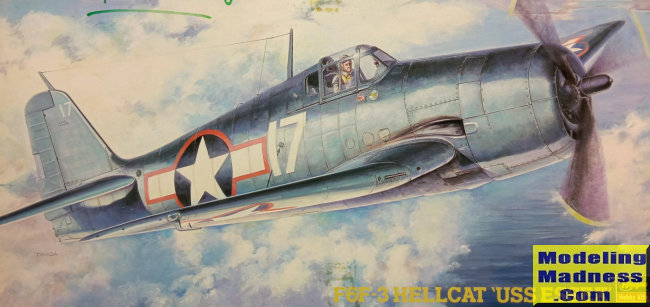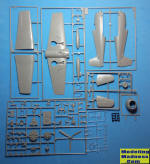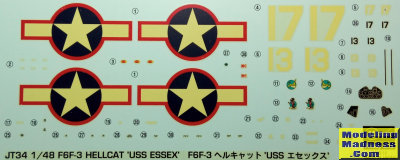
Hasegawa 1/48 F6F-3 Hellcat
| KIT #: | 09134 |
| PRICE: | 19 Euros on sale |
| DECALS: | Two options |
| REVIEWER: | Spiros Pendedekas |
| NOTES: | Initial release |

| HISTORY |
Well designed, powerful and rugged, with its faster competitor, the
Vought F4U Corsair, initially having problems with visibility and carrier
landings the Hellcat was a key element for the US Navy in the second half of the
Pacific War.
Soon after its combat debut in September 1943, its abilities contributed
in securing air superiority over the Pacific Theater. With 12,275 units built in
total (in just over two years!) the successful type was credited with destroying
a total of 5,223 enemy aircraft while in service with the U.S. Navy, U.S. Marine
Corps, and Fleet Air Arm.
| THE KIT |
 Hasegawa
came not later than 1995 with their great (especially for the time) quarter
scale Hellcats, regularly reboxing them till 2015. The specific kit was the 1995
initial release, found sealed in 2003 at one of my hometown’s toy/hobby shops
(sadly all, but one, now closed) and at a price I could not refuse. Typically
for Hasegawa, the kit comes in an excellent quality medium sized top opening
box, featuring a beautiful box art of a VF-9 USS Essex bird.
Hasegawa
came not later than 1995 with their great (especially for the time) quarter
scale Hellcats, regularly reboxing them till 2015. The specific kit was the 1995
initial release, found sealed in 2003 at one of my hometown’s toy/hobby shops
(sadly all, but one, now closed) and at a price I could not refuse. Typically
for Hasegawa, the kit comes in an excellent quality medium sized top opening
box, featuring a beautiful box art of a VF-9 USS Essex bird.
Upon opening the box, I was greeted with 72 medium gray parts, arranged
in 6 sprues. Molding of the relatively hard plastic is first class with
practically no flash and the panel lines are finely recessed.
Cockpit is really nicely detailed, even for today’s standards and will
look sufficient for most of us. Instruments are finely molded raised, with
instrument decals provided as an option. The modeler is supposed to open the two
fuselage cutouts, in order to fit the rear view windows that the specific type
featured.
The prominent engine is also looking great (the front row would benefit
from a wiring harness set). The one piece cowling, though well molded, features
a less prominent chin than in reality. The one piece prop, which is secured in
position by the very effective polycap, is nicely done. Landing gear is finally
very well rendered and the bays look busy enough.
Transparencies are excellently molded and crystal clear. However, the
canopy cannot be installed open, meaning that the great cockpit will be less
visible, unless you go for a vac formed canopy. Instructions come to the usual
outstanding Hasegawa pamphlet style, containing a short history of the type, a
parts map, a color list, with the construction spread in 10 clear steps,
including full color callouts, where applicable.
 Two
identical schemes are provided (Navy Blue topsides, Intermediate Blue in the
middle and the complete fin and white undersides), for a USS Essex and a USS
Lexington machine. Colors are given in Gunze/Mr. Color codes, but also in
generic form. The almost 30 years old decals are very well printed and, despite
some yellowing, look usable, but the “white” represented as “ivory”, so, your
call (and there are nevertheless numerous aftermarket options).
Two
identical schemes are provided (Navy Blue topsides, Intermediate Blue in the
middle and the complete fin and white undersides), for a USS Essex and a USS
Lexington machine. Colors are given in Gunze/Mr. Color codes, but also in
generic form. The almost 30 years old decals are very well printed and, despite
some yellowing, look usable, but the “white” represented as “ivory”, so, your
call (and there are nevertheless numerous aftermarket options).
Instructions want you to first assemble the cockpit and trap it between
the fuselage halves. The engine, main wing and tail planes are next, followed by
the landing gear, drop tank, prop, transparencies, and some teeny-tiny stuff
(guns, pitot tube, antenna mast), ending a simple, straightforward build.
| CONCLUSIONS |
This is still a very nice kit of the Hellcat. Excluding the cowling
chin, which is less prominent than it should (but to many of us it looks
acceptable and, nevertheless, resin replacements are available), all other
shapes look accurate. Molding is crisp, panel lines are finely recessed, cockpit
is superb, the other key areas (engine, landing gear and so on) are great.
Transparencies are nice, but the canopy cannot be attached open. Decals are well
printed and look usable, but the white is represented as ivory. Instructions are
excellent and the build itself is uncomplex. Definitely a kit worth tackling.
Happy Modeling!
May 2023
Copyright ModelingMadness.com. All rights reserved. No reproduction in part or in whole without express permission.
If you would like your product reviewed fairly and fairly quickly, please contact the editor or see other details in the Note to Contributors.